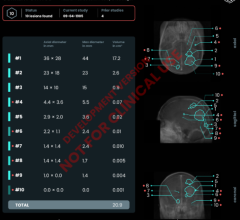September 28, 2011 – Calypso Medical Technologies Inc., developer of real-time localization technology used for precise tumor tracking, announced that the U.S. Food and Drug Administration (FDA) granted investigational device exemption (IDE) approval for its clinical study evaluating real-time tracking of lung cancer tumors during radiation delivery. Patient enrollment is planned at Washington University in St. Louis, and the Cancer Treatment Centers of America in Tulsa, Oklahoma. Investigators in the United States will implant three anchored Beacon transponders in patients’ lungs and use the Calypso System to precisely track tumor location and movement during lung cancer radiation therapy.
“We are very pleased to see Calypso begin the U.S. portion of this important clinical study to assess the clinical experience and safety of anchored transponders in the small airways of patients with lung cancer,” said Daniel Nader, DO, FCCP, national clinical director, pulmonary/critical care and interventional pulmonologist at the Cancer Treatment Centers of America at Southwestern Regional Medical Center in Tulsa, Okla. “The five-year survival rate for lung cancer is grim at just 16 percent; however, with the Calypso System’s ability to track this high-velocity repetitive motion, treatment options for lung cancer patients may expand to include earlier and more aggressive radiation treatment.”
Calypso began the pivotal study in October 2010 at Tygerberg Hospital, affiliated with the University of Stellenbosch, in South Africa, located outside of Cape Town. The multi-center study is also underway at the University of Heidelberg in Germany, and the University Hospital Basel in Switzerland. Early data on the implantation of the electromagnetic transponders in lung cancer patients, and the use of the Calypso System for real-time tracking in these patients will be presented at the upcoming American Society of Radiation Oncology (ASTRO) meeting in Miami.
“There is a clear need for dose-escalation in curative radiation therapy for most patients suffering from locally confined early stage lung cancer,” said Frank Zimmermann, M.D., principal investigator and head of the Department of Radiation Oncology at the University Hospital Basel in Switzerland. “Ideal techniques allow the guidance of the highly focused beams in real-time in spite of the complexity and inconstancy of tumor motion in the lung. They may also enable higher dose therapy than has been possible with more conventional stereotactic techniques.
“The anchored Beacon transponders used by the Calypso System provide us with immediate and precise information regarding the location and movement of the tumor, and this may help make radiation a feasible curative option for a broader group of patients suffering from lung cancer.”
Engineers at Calypso developed the proprietary Beacon transponders for use in lung cancer patients by including an anchoring feature that provides stability in the airways of the lung. To account for the motion associated with lung tumors and ensure that the treatment target stays within the path of the radiation beam, clinicians add a treatment margin or envelope of healthy tissue around the tumor, which includes all of the possible directions the tumor can move as the patient breathes. In order to keep the envelope of healthy tissue being irradiated as small as possible, physicians must be able to accurately track the location of the tumor in real time. Because Calypso’s technology provides this information continuously throughout each treatment session, more radiation is delivered to the tumor, which may improve outcomes. At the same time, less radiation is delivered to healthy tissue, which may lower the incidence of side effects.
According to the American Cancer Society’s 2011 lung cancer statistics, an estimated 221,130 new cases of lung cancer will be diagnosed this year (115,060 among men and 106,070 among women), and the associated mortality at 156,940 will be higher than that of breast, prostate and colorectal cancers combined. Despite the very serious prognosis of lung cancer, treatment progress is being made. More than 400,000 people alive today have been diagnosed with lung cancer at some point.
The Beacon transponders, currently cleared by the FDA for permanent implantation in the prostate and prostatic bed to provide precise, continuous information on the tumor location during radiation therapy, have been engineered to allow for safe implantation in the lung using a standard bronchoscope and proprietary delivery catheter. Calypso’s electromagnetic technology is the only non-ionizing guidance solution that uses internal markers to keep the radiation beam precisely focused on the tumor in real-time, without adding unnecessary radiation. Used in prostate cancer radiation therapy, the Calypso System has been used to treat more than 10,000 patients worldwide.
For more information: www.calypsomedical.com


 February 03, 2026
February 03, 2026 









